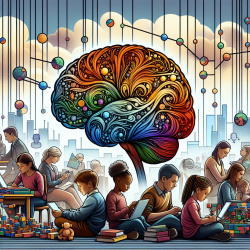Introduction
In the realm of early childhood development, the impact of breastfeeding on cognitive outcomes has been a subject of significant interest. The study titled Nutrients or nursing? Understanding how breast milk feeding affects child cognition provides compelling evidence on how both the nutrients in breast milk and the act of breastfeeding influence cognitive development in children. As practitioners in the field of speech-language pathology, understanding these nuances can enhance our approaches to fostering optimal child development.
Research Insights
The study conducted by Pang et al. (2019) explored the effects of breast milk nutrients and the mode of feeding on child cognition. The research utilized data from the GUSTO cohort, examining children from 6 to 54 months. The findings revealed that children who were bottle-fed breast milk showed better cognitive performance compared to those fed formula. Specifically, these children scored higher on the Bayley Scales of Infant and Toddler Development and the Kaufman Brief Intelligence Test.
Moreover, the mode of feeding played a crucial role. Children fed directly at the breast demonstrated superior memory skills, particularly in tasks involving deferred imitation and relational binding. This suggests that the physical and emotional contact during breastfeeding may enhance memory development.
Implications for Practice
For practitioners, these findings underscore the importance of supporting breastfeeding practices. Encouraging mothers to breastfeed directly when possible could have lasting benefits on a child's cognitive and memory development. Here are some actionable steps practitioners can take:
- Educate parents on the cognitive benefits of breastfeeding and the importance of direct breastfeeding when feasible.
- Collaborate with healthcare providers to create supportive environments for breastfeeding mothers.
- Incorporate breastfeeding education into early intervention programs to promote cognitive development.
Encouraging Further Research
While the study provides valuable insights, it also highlights areas for further research. Understanding the specific components of breast milk that contribute to cognitive development could lead to enhanced nutritional interventions. Additionally, exploring the psychological and emotional aspects of breastfeeding could offer deeper insights into its benefits.
Conclusion
Breastfeeding, particularly direct breastfeeding, appears to have a profound impact on cognitive and memory development in children. As practitioners, leveraging these insights can enhance our ability to support children in achieving their developmental milestones. For those interested in delving deeper into the research, the original study provides a comprehensive exploration of these findings.
To read the original research paper, please follow this link: Nutrients or nursing? Understanding how breast milk feeding affects child cognition.










